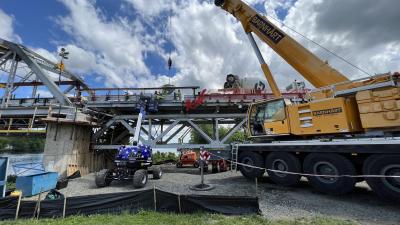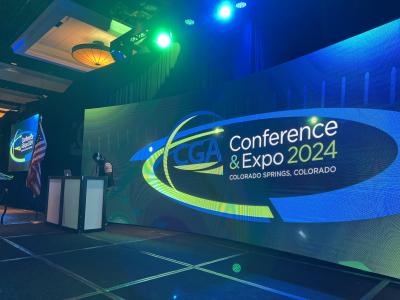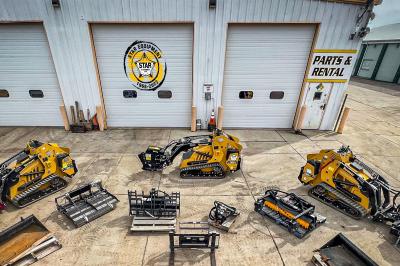BATON ROUGE, LA (AP) A Chicago railcar manufacturer that is getting $30 million in state subsidies to build a plant in Alexandria excluded several experienced contractors from bidding on the project and is expected to award the job to a firm with close ties to Gov. Kathleen Blanco.
Union Tank Car Co. has hired Fortune 500 contractor Shaw Group of Baton Rouge for the design and engineering of the $100 million facility and is close to finishing a contract with Shaw for the construction component, officials with both companies told The Times-Picayune newspaper.
Shaw’s chief executive officer is Jim Bernhard –– head of Blanco’s transition team that helped put together key Cabinet and staff positions for the governor’s new administration. Bernhard also has expressed interest in replacing the outgoing chairman of the state Democratic Party.
The chiefs of two other Louisiana companies who sought to bid on the construction component of the contract said they initially were told they were qualified but then were excluded from the process without explanation.
“It seemed to be a deal worked out early on,” said one of the spurned would-be bidders, Art Favre, president of Baton Rouge-based Performance Contractors. “Shaw had it locked up from the get-go.”
Officials with Union Tank, the governor’s office and Shaw said no strings were pulled for Shaw and that no one from the administration made any suggestions to Union Tank about which contractor to use.
An attorney for the state Department of Economic Development said the agency thinks the contracting has been done fairly and that, as a private company, Union Tank does not have to follow the state’s public bid laws despite the state subsidy for the plant.
Union Tank broke ground on its 850-employee plant this month, six months after announcing the plans for an Alexandria plant that was Louisiana’s largest heavy-manufacturing job announcement in more than 20 years.
The state and local incentive package for Union Tank is valued at $65 million. That includes the land and $30.4 million from the state that the company can use toward infrastructure improvements and plant construction.
In return, Union Tank has agreed to invest $68 million and maintain certain employment numbers when the plant begins making rail tank cars.
The facility should be completed by the end of 2005.
After the plant was announced in June, Union Tank was counting on EMC Services of Houston –– which worked on Union Tank’s Texas facility –– to conduct the design and engineering work for the massive facility, according to Union Tank’s plant project manager, Jim Shirvinski.
But this fall, Shaw took over EMC’s job in Alexandria, according to Shirvinski and EMC Vice President Wesley Dunn.
Shirvinski said Union Tank did not take bids on that component of the project. Dunn would not comment on why the change was made.
Union Tank then asked a handful of companies to offer bids on what fee they would charge to be the plant’s general contractor. Shaw was chosen for that job, although a final contract is not completed.
It is an unusual contract for Shaw, which built its national reputation on chemical and power plant work and pipe manufacturing.
Chris Sammons, Shaw’s vice president of investor relations, said the project represents a chance for the company to expand its range.
Among the companies making bids was Walton Construction Co. of Shreveport, which has $250 million of work under contract in Louisiana.
Greg McCrockin, Walton’s senior vice president, said he thought the bidding was fair. He said Walton could have handled both design and construction but was never asked to bid on the whole package.
Union Tank officials identified five firms allowed to bid for general contractor but would not elaborate about how they were picked. Shirvinski said company size and other factors were weighed in the decision.
The losing bidders were Walton; Ratcliff Construction Co. of Alexandria; the Louisiana firm of Ford, Bacon and Davis; and an out-of-state company. Ratcliff’s president also said bidding was fair. Representatives of the other two companies could not be reached.
Two other Louisiana companies say they do not understand why they were not allowed to participate in bidding.
Favre said he found the process irregular. “It’s just one part of the political process in Louisiana,” he said.
Thomas Turner, president of Turner Industries, a major contractor based in Baton Rouge, said his Harmony LLC subsidiary is well-qualified for the project and provided information to qualify as a bidder.
Dunn, the EMC official, was a main contact for the project until Shaw took over.
Turner said Dunn told Turner Industries on Sept. 17 that it would be included among the bidders. But later that day, Dunn informed Turner officials that Shaw was getting all the work, Turner said.
Dunn “wouldn’t say much about it other than agree with me that someone at Shaw probably has some strong ties with someone either at Union Tank Car or the state of Louisiana,” according to a Turner sales report written at the time.
“I just find it strange,” Turner said.
Dunn would not comment on the motives of Union Tank’s decisions or whether such a conversation took place.
Shreveport Looks Into Trolleys
City officials intend to see if trolleys can help ease worsening parking and traffic problems around downtown casinos.
The city has secured a commitment through the federal government’s mass transit system toward the purchase of three trolleys costing $270,000 each.
The federal government is expected to pay 80 percent of the $810,000 purchase price, and the city will be required to pay 20 percent, or $162,000, according to Gene Eddy, resident director of SporTran.
The trolleys would cater to downtown Shreveport workers, tourists and conventioneers in need of transportation to restaurants, local festivals, shops and gaming casinos.
City officials cautioned, however, that no trolleys will be routed through downtown until additional money is in place for daily operations. Still under study are routes and hours of service, Eddy said.
“All we’re doing at this point is investigating the possibilities and exploring all the opportunities that we have,” said Wendy Benscoter, co-chair of the trolley committee. “This is not a new idea. They’ve been talking about it for 20 years in this market. Many cities have trolley systems, some successful, some not. Right now we’re gathering information on the feasibility and opportunities that exist.”
Frank Williams, executive director of the Downtown Development Authority, said the goal is to have the trolley system in place by the time the doors open on Shreveport’s $100 million convention center, which is under construction at Caddo and Market streets.
Construction is expected to be completed by mid-November, with the opening slated for January 2006.
By spring, the city is also expected to begin construction of a 316-room, $52 million convention center hotel.
Still, it’s anticipated conventioneers will book rooms at other downtown hotels and will need transportation to and from the convention center.
“We feel once it’s up and running there’s going to be a demand for ridership,” Williams said. “We’re also trying to factor in, and will encourage, local office downtown workers and building owners to utilize the trolley system. Part of the overall strategy is to help with the downtown parking situation. If people can park and know they’ll have ready and available transportation, it will work.”
LSU Eyes New Baseball Stadium
LSU athletic director Skip Bertman will ask the board of supervisors to approve construction of a new baseball stadium to open in 2008.
The stadium would be located about 2,000 ft. south of the current site of Alex Box Stadium, and would seat approximately 8,000, the university said in a news release.
“This is the next logical step in building upon the success of our baseball program,” Bertman said in the release.
Bertman built the Tiger baseball program as head coach from 1984-2001 and won five national championships.
Alex Box Stadium was built in the 1930s and has been renovated and updated a number of times. LSU’s proposed Master Plan calls for the stadium to be relocated to permit the expansion of the university’s academic facilities
“Alex Box Stadium is a treasure and this was no easy decision,” Bertman said. “We studied a number of proposals and considered the pros and cons of renovating the Box or building a new facility. A new stadium is in the best interests of the long-term future of LSU baseball and our campus Master Plan.”
The new stadium, which will also be named Alex Box Stadium, will be paid for by the LSU Athletics Department through a combination of the sale of revenue bonds and private donations. The expected cost of the project is approximately $23 million.
If the proposal is approved by the board of supervisors, construction would begin in August of 2006 with the first pitch slated for February 2008.
Today's top stories















